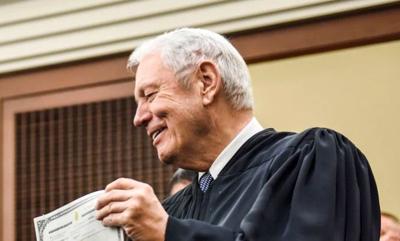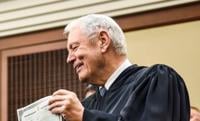
U.S. District Judge Joseph R. Goodwin
CHARLESTON – A federal judge sentenced a former state jail corrections officer to 78 months in prison for her role in the 2022 beating death of an inmate.
On June 9, U.S. District Judge Joseph Goodwin also sentenced Ashley Toney to three years of supervised release. Toney, 25, previously pleaded guilty to violating Quantez Burks’ constitutional rights by not protecting him from unreasonable force from corrections officers at the Southern Regional Jail.
During the sentencing, Goodwin said he weighed Toney’s actions at the jail with her personal characteristics, the nature and circumstances of the crime, the seriousness of the offense and the needs for personal and public deterrence with the need to protect the public and to promote respect for the law.
“And by your own admission however in your plea agreement and your argument in your sentencing memorandum, you knew exactly what was going on at the Southern Regional Jail,” Goodwin told Toney. “Not only did you fail to intervene, as you did in this case, but you were a part of the system at Southern Regional Jail that let constitutional violations and violent assaults persist.
“As I've observed before in another defendant's case here, behind prison walls abuse often goes unchecked, but not so in his case or your case.”
Goodwin said Toney’s sentence and the others in this case “must serve as notice to those who might abuse the trust placed in them.”
“Prison walls will not shield wrongdoing and official authority will not excuse lawlessness,” Goodwin said. “In coming to this sentence, I've considered your arguments for a downward variance as we've discussed. Certainly, as your lawyer ably argued, your young age and immaturity played a role. But this crime that eventually resulted in the death of Quantez Burks is far more than youthful indiscretion or misguided decision-making.”
Goodwin talked about Toney’s “wonderful” childhood and support of her family. She also is the mother of a 15-month-old son.
Still, he said, Toney “stood by” while corrections officers killed Burks.
“You violated your duty,” he told her. “You let it happen. Specifically, you observed other correctional officers use brutal unreasonable force against Quantez Burks, including punching him, stomping on him and inflicting knee strikes, which somehow sounds much too sanitary for the brutal nature of that assault.
“And when other officers took Mr. Burks to another blind spot interview room, you knew what was going to happen. You knew this was a common practice at the Southern Regional Jail.”
Goodwin said Toney knew officers would take inmates, including pretrial detainees who had engaged in misconduct, to blind spots in the jail where officers could use “unreasonable and brutal force and there would be no video evidence and would result in – would permit the officers to escape accountability for their criminal conduct.”
“You were present when Mr. Burks was restrained and handcuffed and while he posed no threat to anyone,” Goodwin said. “You admit that you had the opportunity to intervene and stop the other officers from assaulting him. That's a quote from you. But you did not act at all.”
As he did last month in sentencing former SRJ supervisor Chad Lester for his role in Burks’ death, Goodwin said “for too long and too often these constitutional abuses go unnoticed and unpunished.”
“The Constitution does not abandon those in prison, nor does the constitution empower correctional officers to administer their own justice through physical violence,” Goodwin told Toney. “And in this case, you had an obligation to – a legal obligation to ensure the safety of those in your custody.
“You failed in that duty, and someone died.”
In a letter to the probation office, Toney said the culture at SRJ was bad.
“A toxic place where people who were cruel were ‘celebrated’ and ‘even rewarded,’” Goodwin said, quoting Toney’s letter. “I have no doubt that the Southern Regional Jail was as bad as you describe. But whether it was because of peer pressure or just the nature of correctional facilities, you fell into that cruel circle – cycle of abuse.
“You became a part of the system of abuse and flagrant constitutional violations. The record in this case makes it clear that so few at the Southern Regional Jail respect the law – the very law that they are expected to uphold. The evidence heard throughout the case makes that certain.”
Goodwin told Toney he knows Toney felt pressure as a young woman new to the job, and he said he knows jails are dangerous and require response to inmate misbehavior.
“But no amount of peer pressure can justify the serious and serial constitutional violations that have been revealed as routinely occurring at the Southern Regional Jail,” Goodwin said.
He also recognized Toney has worked to improve her life since the incident and her conviction.
“You've cooperated,” he told her. “You've taken care of your family. These things are commendable. But awaiting sentence at a home and serving a sentence in prison are two different things. A term of imprisonment adequately – more adequately punishes those who have acted outside the law.”
Goodwin told Toney her comments to the FBI about Burks’ character were troublesome. She had told agents Burks was “not a saint.”
“Saint or not, criminal record or not – and he was a pretrial detainee and an un-convicted person – people in prisons are still protected by the Constitution of the United States,” Goodwin said. “The idea that someone who violates the law ‘had it coming’ is deeply un-American and dangerous.
“This is not justice. It's vengeance masquerading as discipline. Under the Constitution, brutality is never warranted.”
Goodwin also said trying to justify and conceal such actions of corrections officers “carries no weight with me.”
“The standard of human decency is required of every person,” he said. “Poor pay, lack of training, underfunding are all serious problems. They exist. They need to be corrected. But they are not excuses for unconscionable, inhumane and unconstitutional treatment of those in the custody of their government.
“Indeed, lawfully, people are sent to prison as punishment, not for punishment at the hands of those sworn to maintain lawful order. … When any correctional officer at a jail begins to see himself or herself as licensed to rough-up or teach those in custody a lesson with fists or boots or knees, they have abandoned lawfulness.
“I regret that our society has seemed to grow comfortable with the idea that people incarcerated are somehow less than human, undeserving of basic constitutional rights. With each sentence of imprisonment, that changes. Neither public ignorance nor institutional apathy can protect correctional officers who abuse their power. In this case, that is when an officer fails to intervene, fails to attempt even to help an inmate who is being mercilessly assaulted. Abuse of power is inexcusable. Harsh punishment and swift justice must illuminate even the darkest corners of our institutions.”
Goodwin said there is “no honor in a badge that watches in silence.”
“There is no virtue in a uniform that turns away,” he continued. “When a person entrusted with the duty to protect chooses, not once in a moment of fear or confusion, but repeatedly, to stand by while harm is done, that's not hesitation. It's betrayal. It is a crime cloaked in cowardice.
“The law demands more. The public deserves more. Justice cannot abide those who, charged with intervention, instead become more spectators in suffering. To fail in one's duty is to fail the people of the United States of America. To do so again and again is to forsake the very purpose of the office held. There is no refuge in inaction. There is no defense in silence. There's only the judgment that comes for those who watched and did nothing.”
Toney agreed to cooperate in the investigation as part of her plea bargain, testifying against Lester. Her attorney asked for five years of probation. Acting U.S. Attorney Lisa Johnston and Assistant U.S. Attorney General Harmeet Dhillon had sought a 10-year prison term for Toney.
Lester was sentenced last month to more than 17 years in prison. Five other former corrections officers will be sentenced soon.
U.S. District Court for the Southern District of West Virginia case number 2:24-cr-00124-1








